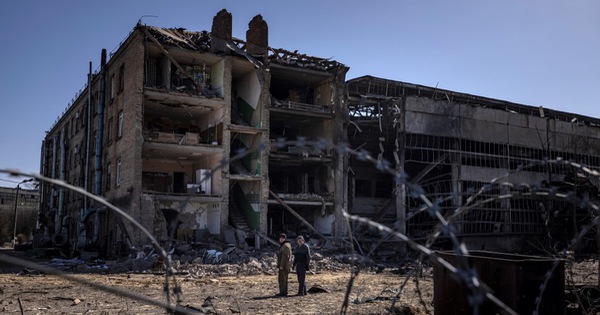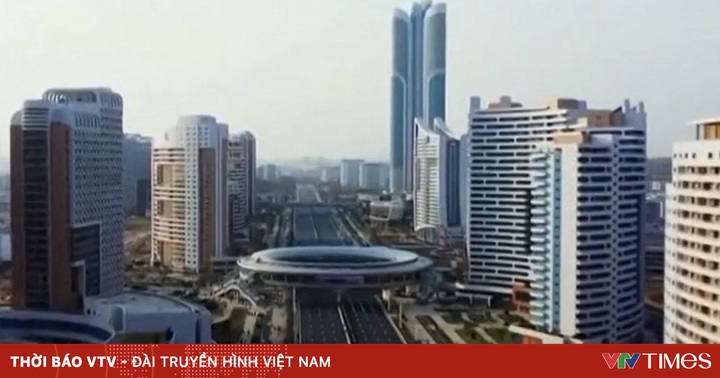Disagreement due to historical factors in Japan-Korea relations is said to be a big challenge for Mr. Biden when he visits the two allies this week.
US President Joe Biden will make his first trip to Asia on May 20 since taking office. After visiting South Korea, Mr. Biden will travel to Japan to meet Prime Minister Fumio Kishida and attend a meeting of the Quartet, a security mechanism established by the US, Japan, Australia and India to respond to the influence of the day. China’s growth in the Asia-Pacific region.
The US views Japan and South Korea, two close allies, as important to building an “alliance of like-minded countries” to counter Chinese and North Korean influence in the region, according to Paula. Hancocks, veteran commentator of CNN on Northeast Asian affairs.

President Biden (right) steps off a helicopter at the White House on May 18. Image: AFP.
Despite being focused on responding to Russia’s military campaign in Ukraine, US Secretary of State Antony Blinken on March 3 declared China’s rise to be “geopolitical test biggest in the 21st century”.
Meanwhile, North Korea has carried out 15 missile launches since the start of this year, and South Korean intelligence believes Pyongyang has completed preparations to conduct a nuclear test at any time. . US intelligence is concerned that North Korea could launch an intercontinental ballistic missile or conduct a nuclear test on the eve of President Biden’s visit to South Korea.
Hancocks said that President Biden’s visit demonstrates the US’s desire for Japan and South Korea relations to unite in response to the current situation.
However, the relationship between these two countries is often “not good rice, not sweet soup” related to the controversy over sex slavery during World War II, as well as the sovereignty dispute over a group of islands in the world. Sea of Japan, which Korea calls the East Sea.
Therefore, mending the relationship between the two largest allies in Asia is considered a difficult task that President Biden faces during this Asia tour, according to Hancocks.
Historical contradictions
South Korea and Japan have a “bitter and difficult relationship” historically, dating back to the issue of forced labor between 1910-1945, when the Korean peninsula was a Japanese colony. .
South Korea accuses Japan of forcing many of its women to work in military brothels during World War II. Scholars continue to argue about the number of victims being forced into sexual slavery for Japanese soldiers during this period, but social activists in 2019 estimate the number may be as high as 200,000 women in South Korea and North Korea.

Former South Korean President Moon Jae-in (left) shakes hands with former Japanese prime minister Shinzo Abe in Chengdu, China, December 24, 2019. Image: Reuters.
Japan apologized in 1993 for its actions in the past. During his time in power, Japanese Prime Minister Shinzo Abe reached a bilateral agreement with Seoul on the issue of “comfort women” in December 2015, laying the foundation for bilateral relations.
However, this process stopped when Moon Jae-in was elected president of South Korea in 2017.
In 2018, South Korea’s Supreme Court ruled that two Japanese companies must compensate Koreans for forced labor during Japan’s occupation of the Korean peninsula. However, the Japanese government believes that the ruling violates the 1965 agreement to normalize and establish diplomatic relations between the two countries, which agreed to close the issue of forced labor.
In July 2019, Tokyo imposed trade restrictions with Seoul, saying the move was due to a decline in trust with South Korea. Seoul strongly condemned the decision, accusing Japan of using its commercial advantage to retaliate against the court’s ruling.
In response, the Koreans launched a movement boycott Japanese goods, and the government of this country threatened to withdraw from the Agreement on Sharing Military Intelligence (GSOMIA), pushing Japan-Korea relations to the lowest level after five decades of normalization.
Territorial disputes
The Japan-Korea conflict is also related to sovereignty disputes over the Dokdo/Takeshima island group in the Sea of Japan. South Korea currently controls this group of islands and calls it Dokdo, but Japan also claims it and calls it Takeshima.
South Korea claims to have liberated the island group from Japanese rule since 1945, while Tokyo accuses Seoul of illegally occupying the feature.
In November 2021, Japan’s Deputy Foreign Minister Takeo Mori was cancel press conference with their Korean and American counterparts to protest the visit of Kim Chang-yong, Commissioner General of the Korean National Police Agency (KNPA) to this group of islands.
Tensions continued to increase when Chief Cabinet Secretary Hirokazu Matsuno on May 17 asked Seoul to explain through diplomatic channels about a Korean state-owned company conducting survey activities near the Dokdo/Takeshima island group. . Mr. Matsuno affirmed that Tokyo does not accept any exploration and survey activities in its exclusive economic zone (EEZ).

Location of the Dokdo/Takesshima island group. Graphics: DW.
Evans Revere, a former US diplomat, said that as tensions between Japan and Korea increase over security and economic issues, it will be difficult for the US to fulfill its obligations to them as well as the strategy to deal with China. China and North Korea if Tokyo and Seoul do not actively negotiate and cooperate with each other.
However, Revere said Biden’s task of healing will be a bit lighter, when both South Korea and Japan have new leaders who share tough views on China, North Korea, as well as desire to develop military relations with the United States.
South Korea’s new President Yoon Suk-yeol said he would consider letting South Korea join the Quartet in the group’s upcoming summit meeting in Japan.
Both Mr. Yoon and Japanese Prime Minister Kishida have also shown signs that they are willing to put the past behind. Mr. Yoon extended an olive branch to Japan last month, sending a delegation to Tokyo ahead of his inauguration, as part of a plan to give South Korea a “fresh start” as a “important country.” global point” he stated in his campaign speech.
The Korean delegation delivered to Mr. Kishida a letter from Mr. Yoon. Prime Minister Kishida, after receiving the letter, said that the US – Japan – Korea strategic cooperation is more necessary than ever in the context of international security threats, and sent Foreign Minister Yoshimasa Hayashi to the inauguration ceremony of the President. President Yoon earlier this month.
However, commentator Hancocks said that even if the leaders of Japan and Korea put national interests above past disagreements, they still have to pay attention to the reaction of domestic public opinion before the elections. important coming.
South Korea will hold local elections in June, while Japan will elect the upper house in July.
Professor Kohtaro Ito, an expert at the Canon Institute for Global Studies (CIGS), said the majority of voters in Japan are the older generation, have nationalist views and favor a tougher approach towards Korea. Therefore, Mr. Ito said that President Biden is unlikely to make any breakthrough during the visit.
Revere shares the same opinion. “Nationalism often has a huge impact on relations and historical issues between the two countries, which can hinder any reconciliation efforts,” he said.
Duc Trung (According to CNN/Kyodo News)
at Blogtuan.info – Source: vnexpress.net – Read the original article here



